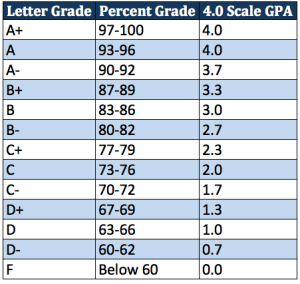It’s nuts that I’m already this far on my third book, which will be released in late July or early August. It seems just last month I launched Freedom Mindset (actually released in March).
I guess writing a book is like many things in life. Once you do it a few times and take bruises along the way, you become more efficient each time.
Now that I’ve finished writing the first draft to this college success book, personally revised a few more drafts, and hired my editor, things are really speeding up.
Also, thanks to all of you who voted on the book title through email responses and social media responses, we’ve found the title of this book: How To College.

What’s How To College about? It’s designed as an all-inclusive guide to help you succeed at college. This book lays out in-depth strategies for you to get the best grades doing the least amount of work, create a thriving social life, make the most of your education, eliminate stress, build a knockout resume, set yourself up for amazing post-grad opportunities, and much more.
From extensive research, interviews with standout college students on this site, and my personal college experience, I created this book to help you every step of the way.
It’s highly-relevant for the incoming college freshman to the college senior.
And it’s practically all new content. So if you think my college-success blog posts are even halfway decent, you’re going to love this book. I know it!
Three Sample Excerpts
Since I want to show my appreciation for you being on my email list and reading my blog, I’m showing you a sneak peek of my new book content before my editor, girlfriend, and family sees it.
Below are three never before seen excerpts from my upcoming book How To College.
I hope you enjoy them!
Sample 1: Overschedule to drop classes every semester
Bad classes with bad professors are a thorn in the side of below-average students to superstar students. An innocent, blind move to schedule a class you think sounds interesting could turn into your worst nightmare. Common bad course symptoms include working your butt off to only get a C, lifeless course material, or a clashing professor.
All of these make you unhappy and pissed about your class choice. The only saving grace is that taking miserable courses are a part of college and happen to everyone… unless they don’t.
I’m here to tell you it doesn’t have to be that way. You don’t have to go through the pressure of pitching a perfect game with your schedule each semester to make sure you take good courses with excellent (or reasonable) professors.
There’s another solution: you register for one or two extra classes, and then drop the worst one(s) before the deadline. Yes, this 100% works since many universities let students drop any course up to a certain deadline early in the semester.
Here’s what goes down. Say you normally would schedule five classes, but you’re utilizing this strategy so you schedule seven. Go to all seven classes the first week. Get a sense of the professor, their teaching style, the course expectations, and how reasonable the work is based on the syllabus.
This should give you a good read of what’s to come in the rest of the course. Because the boring, old professor who rambles week one isn’t suddenly going to turn into a lively comedian in week four. Then you pick the best five classes and drop the other two.
Instead of praying you hit 100% accuracy on all your class picks, you lower the standard to a doable 71.4% (5/7) and end up with an entirely better semester because of this move.
There’s only reward and no risk with this stint. There are no penalties if you drop these extra courses before the deadline. They will never show up on your transcript or affect your grade point average. And your tuition bill isn’t any higher since you don’t end up taking the extra courses. The only tiny downside is going to seven classes the first week, but it’s well worth it when you consider the length of a four month semester.
Gaming the system isn’t wrong. It’s just making the most of the opportunity presented to you. Do this, and you’ll diminish the odds of being in the trainwreck course with the teacher from hell. Now you’re learning how to college.
Sample 2: Find your stress release activity
Confused students believe college is a sprint where they need to go, go, go at all times. They can hardly keep everything they need to do straight in their mind, let alone accomplish it all. And when too many activities pile up, stress comes knocking right behind it to cause damage.
Some stress puts you in a bad mood. Significant stress can cause depression. And an overwhelming amount of stress can cause severe procrastination and mental breakdowns.
For example, I know a bright girl who went to an Ivy League school. She scored at the top of her classes, took leadership roles in three student organizations, and studied a foreign language on the side—just for fun. Then the assignments and responsibilities piled up so high during her junior year that the stress crippled her. An all-star student became so overwhelmed that she couldn’t do any work and had a nervous breakdown. Her parents checked her into a mental hospital to recover.
College isn’t a sprint, it’s a marathon. And you can achieve a ton in college, but not if you get burnt out. So the way to stay fresh is find your stress release activity and once a week let yourself get away from it all. Leave all the students, campus noise, and college-related stress behind you.
To do this, go on a morning run. Hike a nearby park and surround yourself in nature. Find a small cranny in a local library (not the campus library) to get lost in a book. Shoot baskets at night by yourself. Finding an activity that’s off campus and by yourself is the goal here.
During this time, give your mind a break from thinking of your upcoming exams, looming group project, friend drama, summer internship search, and other weight. Give yourself permission to release it all because when you come back from your escape, it will all be there waiting for you (lucky for you, just kidding).
Finding your stress release activity isn’t a miracle worker. It won’t clear your busy schedule. But it will give you more energy and freedom to tackle your schedule. And that’s what matters. A stress release activity reminds you that you run your schedule, it doesn’t run you.
With a few of these activities in your pocket, you have an outlet when you start to feel overwhelmed. Doing this to recharge, even if it’s only for half an hour, will go a long way to support your emotional health during the craziness that is college life.
Sample 3: Think big
College students are in the perfect scenario to think big. Their brain is close to fully developed and they still have 60 or more years in front of them to accomplish what they set out to. But so few students decide to think big and instead they practice thinking small at all hours of the day. And by not spending time to think big, you’re always going to live small.
To desire to think big, consider what happens when you think small. Small thinkers grind away at their to-do list to get everything done, and feel they don’t have time to be creative or think with a bigger perspective. They’re focused on being efficient, which isn’t a bad thing in itself. So they run from class to assignment, complete random tasks like returning books and returning borrowed clothes, and call it a day. They react to life’s circumstances as they come. However effective this small mindset is, the bigger problem is it causes your whole life to become a to-do list. Your ultimate achievement is to only cross these small tasks off your list, before you start all over tomorrow. Talk about depressing and living the rat race. Plus, when this mindset is developed in college, it sticks with you or gets worse in your career. You complete your small tasks, but they never end, as life passes you by.
But by thinking big you act ambitious, and live inspired in your pursuit of your journey. Where small thinkers are reactive to life’s events, big thinkers are proactive to pursue the day’s most valuable activities. Each day has a new meaning and purpose.
Big thinkers are ignorant of the odds because the odds are for spectators. The odds of success don’t matter at this point. Let your mind run free with zero limitations to see how far you can get.
For example, how could you create an organization that changes the world on a global scale? What community problem needs to be addressed and how could you find the solution? What’s an area you can solve a problem for people and scale it?
When you plant the seeds to think big in college, you cultivate the habit of looking at the big picture and living big in the present to the future. Once you experience the results from thinking big and acting big, you’ll see there’s no other way to live.
Look out for the book cover and the official publish date announcement as I prepare for the How To College book launch this summer!



